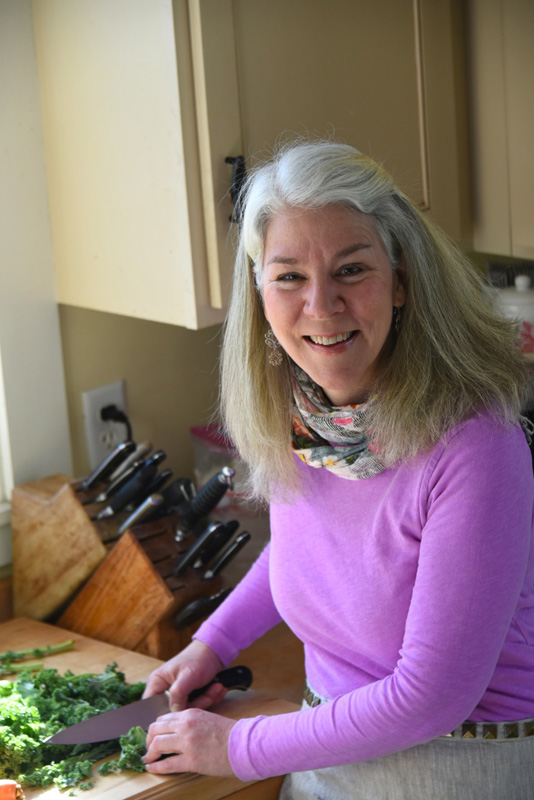Susie Middleton grew up in a food obsessed family but because she was the baby of the family she didn’t do any cooking. She just watched and enjoyed the fruits of her family’s labors, in particular her father.
“He grew up in a family of six boys where everyone learned to cook,” she said. Her mother came late to the party. “She barely knew how to boil water when they were married.”
But mom caught on quickly, and eventually Ms. Middleton made up for lost time too. She has just published her fourth cookbook, Simple Green Suppers, by Roost Books.
On Sunday, April 9, there will be a book launch party at Morrice Florist where Ms. Middleton and the photographer of her book Randi Baird, along with author Sarah Waldman and photographer Elizabeth Cecil, creators of the new cookbook Feeding a Family, will discuss the making of a cookbook.
Vegetables are the stars of Simple Green Suppers, taking Ms. Middleton and the reader back to her roots, spending summers on the coast of Delaware. The family lived in Washington, D.C., but summers are what Ms. Middleton remembers best.
“Summers were the happy time,” she said. “Fresh peaches, corn, tomatoes, Dad had a vegetable garden and Grandma planted lima beans. She was a fabulous cook. There is a cooking gene that is passed down and sometimes skips a generation. I am sure of it. Grandma had it and I have it.”
Ms. Middleton began her own cooking journey after college when she moved to New York city. She also started her long, successful career in publishing, doing a summer program at NYU, which then led to her first big job at 17 Magazine. From there it was off to Connecticut as the associate editor of Sailing World. She eventually rose to managing editor, moving to Rhode Island when the magazine’s office changed to Newport.
In Rhode Island she and her husband planted a garden and cooked at home.
“I fell in love with it,” she said. So much so that she took an unexpected leap, with no real plans of where it would lead: she enrolled in culinary school back in New York city.
After school she took her first job in the kitchen, at the legendary Providence restaurant Al Forno.
“It was a formative experience,” she said. “I was the salad girl and they were ahead of their time.” They had wood-fired ovens, cooked at high heat, and utilized all of the nearby farms. Ms. Middleton became obsessed with vegetables, she said. Her cookbooks are a testament to this, from the main event to the accompanying sauces.
“I have about 30 sauces in the book that are everything from lemon tahini to farmhouse vinaigrette, blender caesar dressing, miso crystallized ginger vinaigrette that again can be made ahead. If you only make one of those things, you’re well on your way to tasty meals for the week.”
After getting experience in the high heat and high intensity restaurant world, Ms. Middleton went back to magazines, but this time with a focus on cooking. She started as an associate editor at Fine Cooking and eventually rose to editor in chief. The next logical step was writing her own cookbooks and living on Martha’s Vineyard.
“When I left Fine Cooking I had a contract for my first cookbook,” she said. That book was Fast, Fresh and Green. Fresh Green Table followed and then Fresh From the Farm, which was part memoir of her life on the Vineyard, growing vegetables at Green Island Farm in West Tisbury.
Although vegetables are the main event in her latest book, Ms. Middleton spends as much time focusing on the supporting roles. Developing a well-stocked larder is essential for any homecook. That way when you bring your fresh vegetables home (from the grocery store, the farmers’ market or your garden) everything else is already there. The eight chapters are divided by pantry item: noodles, grains, beans, leaves, toast, tortillas, eggs, broth.
“Basic things you can stock up on and I give lots of information about what the varieties of lentils are and grains that people are maybe not so familiar with and afraid to cook” she said. “I say, look, you can just dive right in, and here are some good techniques to cook these things and how to keep them.”
For toast (one of her favorite chapters), things get scientific. Good bread equals good toast, but Ms. Middleton breaks it down to why bread should be kept frozen. It’s a trick she learned from her mom, and is rooted in molecular science. At cold temperatures, the starch molecules chemically realign. At freezing temperatures, they don’t. And on the counter, bread molds.
Susie Middleton will speak on Saturday, August 5 at 9:00 a.m. at the Harbor View Hotel, and on Sunday, August 6 at 9:30 a.m. at the Chilmark Community Center.









Comments (2)
Comments
Comment policy »